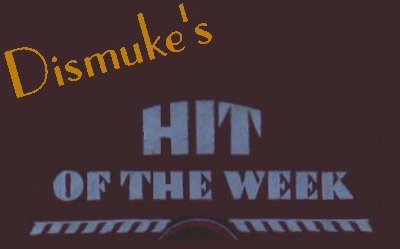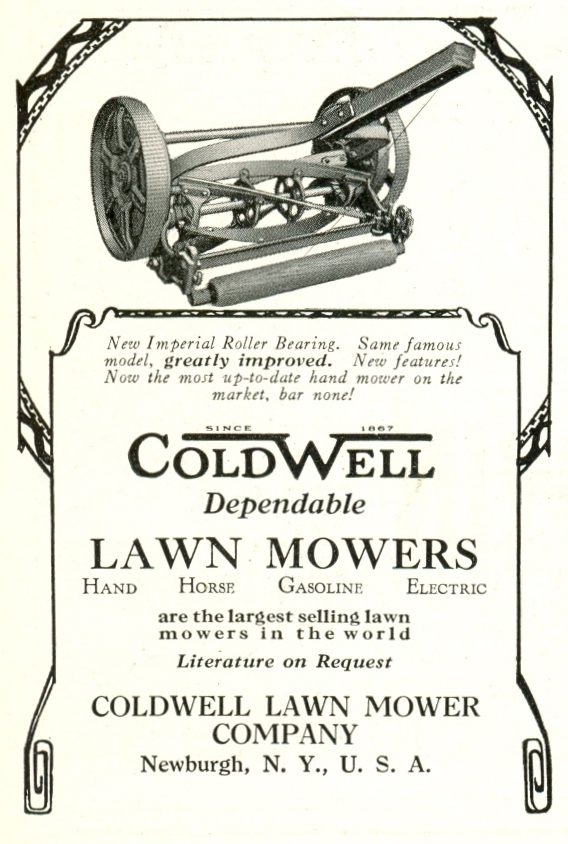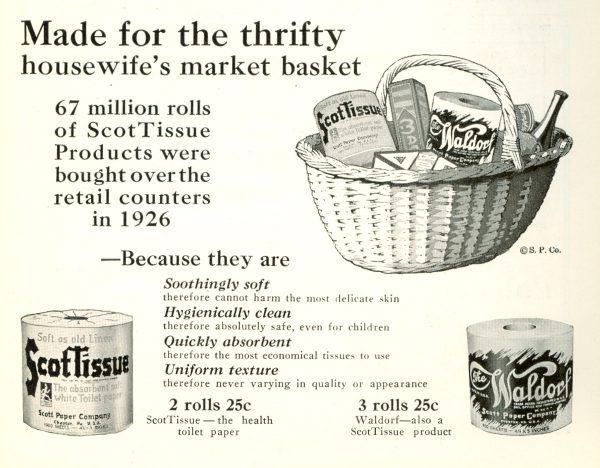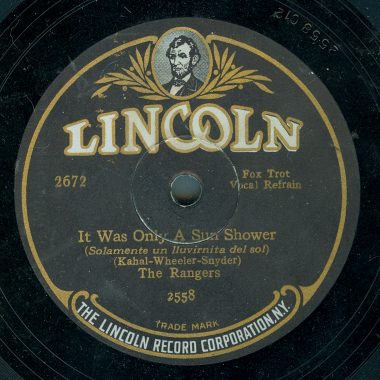

November 2008
November 27
This week's Hit of the Week is brought
to you by

Ful-Vue Bifocal Glasses
American Optical Company
Sothbridge, Mass.
(from 1932 ad)
There's
Oceans of Love By The Beautiful Sea
Dick Robertson And His Orchestra
1932
(Perfect 12824-B)
Holding
My Honey's Hand
Dick Robertson And His Orchestra
1932
(Perfect 12824-A mx 11936)
This weeks's selections come courtesy
of the collection of regular guest contributor Matt
From College Station.
Dick Robertson was an extremely
prolific recording studio vocalist in the early 1930s who cut sides with
a number of bands. He also was one of the house vocalists for the
American Record Company labels. To the best of my knowledge, Robertson
did not have an actual band of his own. The band credited to him
on records consisted of studio musicians. In the mid 1930s,
Robertson moved to the Decca label where he would record through 1942.
His Decca issues were usually accompanied by a "hot" Dixieland style band.
"There's Oceans of Love By The Beautiful
Sea" is a rather catchy song that was recorded by several bands in 1932.
"Holding My Honey's Hand" was composed by bandleader Ben Bernie who also
recorded a version of it.
- Dismuke
If you have questions or
comments about the music or would simply enjoy interacting with friendly
people who share your interest in it, join in the conversation on Dismuke's
Message Board.
EXTRA
This section will present
78 rpm recordings that do not fall within the range of the vintage pop
and jazz fare that I usually present. Here I will feature
recordings from a wide variety of eras, musical genres and nationalities
as well as occasional spoken word recordings.
J'Aime
Les Femmes
R Moretti J Boyer ???
1933
(Mag Nis 1003 mx 7895)
Pour
Mettre Un Peu D Entrain
R Moretti J Boyer
1933
(Mag Nis 1003 mx 7895)
Both of these songs come from the
1933 French musical film Un soir de réveillon. Unfortunately,
there is now a bit of a mystery regarding the performance credits.
When I digitized the recording a few months ago during one of Matt From
College Station's visits to Fort Worth, I included in my notes information
from the record's label that I though was artists' credit. In my
subsequent research on the songs, however, I found information that suggested
that R. Moretti and J.Boyer might have been the composers. The fact
that the record label and most of the information I found on the Internet
was entirely in French certainly did not help. Of course, it
is entirely possible that R. Moretti and J. Boyer could have been both
the composers and the performers on this recording. But it
is also possible that I simply misread the record label. Unfortunately,
Matt now has the record in storage at a location that he does not have
access to prior to this update being posted. When he gets a
chance to access the record and take another look at it, I will go back
and update the archived version of this update accordingly.
You can see a video clip on YouTube
of the original film performance of "J'Aime Les Femmes" at this
link. The music starts about one minute into the clip.
- Dismuke
If you have questions or
comments about the music or would simply enjoy interacting with friendly
people who share your interest in it, join in the conversation on Dismuke's
Message Board.
November 13
This week's Hit of the Week is brought
to you by

Coldwell
Dependable
Lawn Mowers
(from 1928 ad)
Broken
Hearted Baby
Arrowhead Inn Orchestra
1928
(Brunswick 4053)
Moonlight
Madness
Arrowhead Inn Orchestra
1928
(Brunswick 4053)
The Arrowhead Inn Orchestra only
made two record, both of them for Brunswick in 1928. The band
was one of many under the control of Meyer Davis who ran an entire chain
of dance bands throughout the USA. According to one online
source, Davis started his first band in 1915. A 1917 publication
called the Handbook of Private Schools mentions that the Meyer Davis
Orchestras employed over 300 musicians to fulfill its contracts and that
it offered programs of "especial interest to the best schools."
According to a 1941
Time Magazine profile, Davis, at the time, controlled 89 bands with
a total of 1,100 musicians. While most of his bands were concentrated
in the Northeast, I have been told that one of the 1930s era house bands
in the Worth Theater in Fort Worth, Texas was under his control.
I am not certain where the Arrowhead
Inn the band was named after was located. I was able to find
two possibilities. One was the Arrowhead Inn in Burnham Illinois
just south of Chicago which was a rough and notorious gambling joint controlled
by Al Capone. The other, and I suspect more likely, possibility was
Ben Riley's Arrowhead Inn Restaurant which was founded in 1897 in
Saratoga, New York on land Riley's innkeeping great-great-grandfather had
been granted by King George III. Legend has it that it was
Riley who introduced frog legs as a delicacy. In 1908 he relocated
the restaurant to Manhattan's Washington Heights neighborhood.
In 1923 he sold the property to developers and moved the restaurant to
Riverdale Avenue and 246th Street in the Bronx. At that location,
the restaurant was very popular with the New York high society throughout
the 1920s and 1930s and featured live music. Later Riley moved
the restaurant again to Yonkers, New York where he died in 1944 as a result
of a fire in the restaurant. Considering that the Meyer Davis
Orchestra was most active in the Northeast and specialized in performing
for society functions, I suspect that New York Arrowhead Inn is most likely
the one that gave this band its name.
10/14/08 P.S
In my haste to get the update published, I forgot to mention that both
Arrowhead Inn Orhestra selections and the Mildred Bailey selections in
the Extra section come courtesy of the collection of Matt From College
Station.
- Dismuke
If you have questions or
comments about the music or would simply enjoy interacting with friendly
people who share your interest in it, join in the conversation on Dismuke's
Message Board.
EXTRA
This section will present
78 rpm recordings that do not fall within the range of the vintage pop
and jazz fare that I usually present. Here I will feature
recordings from a wide variety of eras, musical genres and nationalities
as well as occasional spoken word recordings.
When
It's Sleepy Time Down South
Mildred Bailey With The Casa Loma Orchestra
1931
(Brunswick 6190)
Blues
In My Heart
Mildred Bailey With Casa Loma Orchestra
1931
(Brunswick 6190)
Mildred Bailey is one of my favorite
1930s female vocalists. The sister of Al Rinker, one of Bing
Croby's sidekicks with the Paul Whiteman's Rhythm Boys vocal group, she
was introduced to Paul Whiteman by Bing Crosby in 1929 during the filming
of King of Jazz. Whiteman was immediately impressed and she
was a vocalist with the band until 1932. While Bailey was popular
on Whiteman's radio programs, interestingly enough she did not record with
the band until about three weeks after these sides were cut with the Casa
Loma Orchestra. Her first recording with the Whiteman band
was yet another version of "When It's Sleepy Time Down South."
Bailey married Whiteman's xylophone player Red Norvo who later left to
form his own successful band which regularly featured her as vocalist.
The two billed themselves as "Mr. and Mrs. Swing." Her popularity
declined in the 1940s and she spent much of that decade troubled by financial
and health problems. She died in 1951.
- Dismuke
If you have questions or
comments about the music or would simply enjoy interacting with friendly
people who share your interest in it, join in the conversation on Dismuke's
Message Board.
November 6
This week's Hit of the Week is brought
to you by

Scott Paper Company
(from 1927 ad)

What
Do We Do On A Dew Dew Dewy Day
Lane's Dance Orchestra
1927
(Lincoln 2672 mx 2569)
It
Was Only A Sun Shower
The Rangers
1927
(Lincoln 2672 mx 2558)
Baby
Your Mother
Bob Haring And His Orchestra
1927
(Lincoln 2695 mx 2593)
You
Sing That Song To Somebody Else
Clyde Doerr And His Dance Orchestra
1927
(Lincoln 2695 mx 2612)
Here are a couple of records
on the Lincoln label that I recently acquired. Lincoln was a subsidiary
label of Cameo records and was produced from 1923 until 1929 when Cameo
was part of the merger that formed the American Record Corporation.
Many recordings on the Lincoln label were also issued on Cameo and on the
Romeo label after it was introduced in 1926. This was the case
with this week's selections.
Both recordings on Lincoln 2672
"What Do We Do On A Dew Dew Dewey Day" and "It Was Only A Sun Shower" were,
in fact, performed by the Sam Lanin Orchestra with Lane's Dance Orchestra
and The Rangers merely being recording pseudonyms. The exact
same recordings were also paired on Cameo 1207 and Romeo 435 with entirely
different artist credits.
The other two selections "Baby Your
Mother" and "You Sing That Song To Somebody Else" on Lincoln 2695
were credited to the actual bands performing them as was also the case
when the the recordngs were issued on Cameo 1230 and Romeo 458.
Unlike today when popular songs
tend to be associated with a particular artist, in the early decades of
the 20th century the music industry was dominated by songs composed for
and published by the Tin Pan Alley publishing houses.
If a song was associated with a successful stage production or film or
showed other signs of becoming a hit, all of the big record labels
typically issued their own versions of it, and, in some cases, multiple
versions. So-called "dime store labels" such as those issued by Cameo
were sold at a reduced price to a cost conscious audience that was primarily
interested in obtaining a competent recording of a particular song as opposed
to a performance by a specific artist.
Cameo records were primarily sold
through Macy's Department Store in New York City and Romeos were sold through
the S. H. Kress dime store chain. I have never learned if the Lincoln
label was pressed for a specific store or chain or if it was sold through
a variety of outlets. Of the three labels, I run across far
more Romeos than I do Cameos and only rarely come across Lincolns.
Part of that might have to do with the fact that I live in a part of the
country where Kress had a very strong presence.
"What Do We Do On A Dew Dew Dewey
Day" was among 1927's more successful songs and was recorded by a number
of artists. I enjoy this particular recording because I think the
sound effects used during the vocal section are rather amusing.
The song enjoyed a brief revival of sorts in 1948 when it was used in the
presidential campaign of Thomas Dewey.
The other three songs were also
published in 1927 and were also recorded by a variety of artists.
Sam Lanin and Bob Haring were both
very prolific studio bandleaders throughout the 1920s and worked for several
labels under many dozens of recording pseudonyms. Clyde Doerr was
a saxophone player who got his big music break in 1919 with the Art Hickman
Orchestra in San Francisco. By 1921 he moved to New York where he
became leader of the Club Royal Orchestra which briefly substituted for
the Paul Whiteman Orchestra at New York's Palais Royale when the Whiteman
band was on tour in England. For the rest of the 1920s Doerr was
in high demand both as a bandleader and as a saxophone player and became
quite successful financially, only to lose much of it in the stock market
crash of 1929.
- Dismuke
If you have questions or
comments about the music or would simply enjoy interacting with friendly
people who share your interest in it, join in the conversation on Dismuke's
Message Board.
EXTRA
This section will present
78 rpm recordings that do not fall within the range of the vintage pop
and jazz fare that I usually present. Here I will feature
recordings from a wide variety of eras, musical genres and nationalities
as well as occasional spoken word recordings.
Smiles
And Chuckles
Six Brown Brothers
1917
(Victor 18385-A)
Comedy
Tom 
Six Brown Brothers
1917
(Victor 18385-B)
The Six Brown Brothers are best
remembered as an all saxophone band that recorded for the Victor and Emerson
labels between 1914 and 1920. At the time, the brothers were extremely
well known on the vaudeville circuit. The band got its start as an
act for the Ringling Brothers Circus which Tom Brown joined in 1904 with
three of his brothers joining him soon afterwards. Eventually the
act grew to six bothers, Tom, Alec, Percy, Fred, William and Vern.
At times, especially in the group's later years, non family member musicians
were also included.
Prior to the band's 1914 switch
to an all saxophone format, the band was multi-instrument and featured
the sort of blackface and comedy routines that were typical of the era.
The band was instrumental in introducing the still rather obscure saxophone
to a general audience and for launching a "saxophone craze" which led to
the instrument's very prominent role in the jazz and dance bands of the
1920s and 1930s.
The band's records often featured
nice, upbeat ragtime style songs - as is the case with the recordings featured
here. Personally, however, I don't think that the band's
overall sound has aged very well at all. As someone who listens
to and is fond of the rich orchestrations of the 1920s era dance bands
which followed, the all saxophone arrangements sound rather flat and bland
by comparison. However, as always, it is important to keep
in mind the context of the time. In the 1910s, the band's sound
was new, unique and very much a novelty. As the popularity
of the saxophone grew and was taken in new directions by other artists,
the novelty of the Six Brown Brother's sound gradually diminished as did
their popularity. After a few successes on Broadway the band
returned to vaudeville. By the early 1930s the advent of talking
pictures and the Great Depression had eliminated the vaudeville circuits
and the group broke up in 1933.
- Dismuke
If you have questions or
comments about the music or would simply enjoy interacting with friendly
people who share your interest in it, join in the conversation on Dismuke's
Message Board.

|


